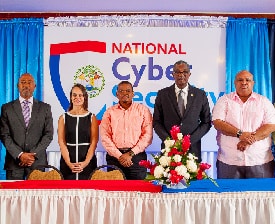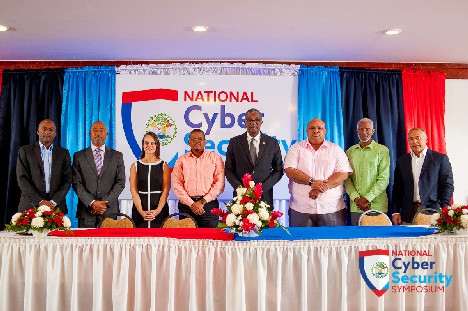Belize leads Caribbean race to cyber preparedness

By GERARD BEST
BELIZE – Scandalous Facebook pages carrying the name “Belizean Cheaters” sparked public uproar in the country, revealing sexually explicit details of adulterous affairs involving men, women and even children.
The sleazy barrage also stoked nationwide concerns about cyber safety, and the country is now working urgently to finalize cybercrime legislation, train law enforcement agencies and raise awareness among its vulnerable public.
By raising consequential questions about privacy, law enforcement, individual rights and cyber-protection, the sordid incident put a spotlight on the need for a wider public conversation about online safety and Internet governance issues. And the country’s first-ever national cybersecurity symposium, which took place in Belize City from April 24 to 28, proved to be a timely icebreaker.
Hundreds took part in the weeklong event, including judges, lawyers, businessmen, bankers, military and law enforcement officers, network technicians, government officials and lots of concerned citizens. Many were simply taking the rare opportunity to learn about the fundamentals of cybersecurity.
But others saw an unprecedented opening to emphatically break the silence around issues of online pornography, cyber bullying, identity theft, computer hacking, pedophilia and human trafficking.
“Belize is ill-prepared legally and otherwise to effectively address these challenges,” said First Lady Kim Simplis-Barrow, Special Envoy for Women and Children.
“Cyber crime knows no borders, we’re all in this together,” said Adrienne Galanek, chargé d’affaires at the U.S. embassy in Belize.
“In the United States, we are currently in the process of reviewing our cybersecurity national strategy and we encourage Belize and other nations to similarly review as needed their cybersecurity national strategy.”
Indeed, the week culminated in the formation of a multisectoral task force charged with crafting a national cyber security strategy, working with a wide cross-section of society and with the declared support of top-tier officials, including Deputy Prime Minister Patrick Faber, Chief Justice Kenneth Benjamin and Attorney General Michael Peyrefitte.
“Cybersecurity is a very important issue. It deserves all of our attention. The government is fully committed to playing its part in protecting our country and our citizens from cyber threats. We will not drop the ball,” Faber said in the feature address at the formal opening.
The high-level talks highlighted the urgent need to update the country’s legal and law enforcement framework to criminalise and prosecute online misdeeds. On this point, the Peyrefitte said the Attorney General’s office was “fully in partnership” with the symposium organisers.
“It has been determined that cybercrime and cyber issues must now have a prominent place among judicial education. With impending legislation, that judicial education has to be fast-tracked,” the Chief Justice said.
The week was hosted by the Belize Public Utilities Commission, and jointly organised by the Caribbean Network Operators Group (CaribNOG), a non-profit that delivers technical training in network security.
“Cybersecurity is a priority for the entire Caribbean. As citizens, businesses, financial institutions and governments place greater reliance on Internet-based technologies, greater attention has to be paid to increasing building local and regional capacity to protect our computer networks and systems,” said Bevil Wooding, executive director of CaribNOG and an Internet Strategist with Packet Clearing House.
“Cybercrime and cyber-safety issues impact all sectors of society. So the crafting of any solution has to involve all areas as well. That’s why a holistic, coordinated, national approach, as seen in Belize, is the most effective way to address the issues related to cybersecurity.”
On the back of this historic event, Belize is emerging as a leader in regional cybersecurity. But much remains to be done. John Avery, chairman of the Public Utilities Commission, may have summed it up best in his remarks.
“This symposium is just the start. However, the people of Belize are committed to building on the solid foundation that has been laid.”

PHOTO: Caribbean Network Operators Group


